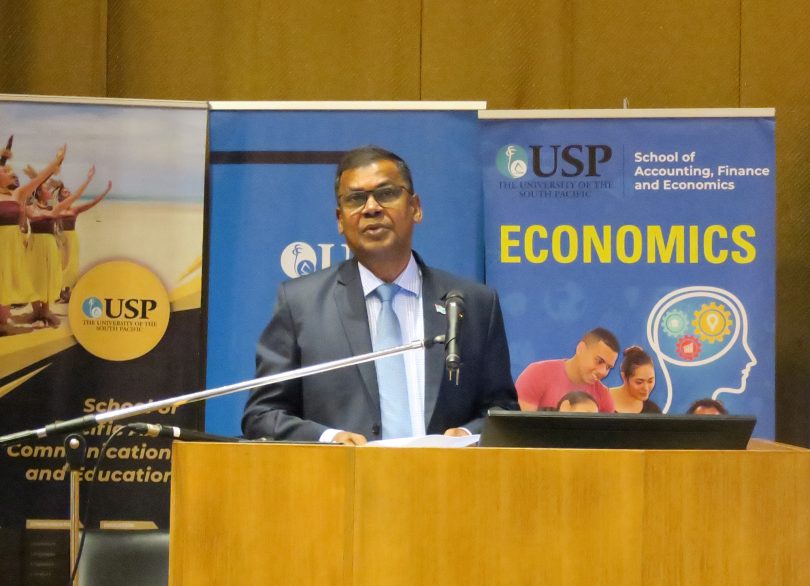By Biman Chand Prasad
By now we are all aware that we are at another critical juncture – in my mind the most critical juncture ever – in the history of our region and its future.
Our Blue Pacific faces not just the existential threat of climate change, but many other challenges in relation to geopolitics, superpower conflict, major social and economic challenges, a declining resource base in fisheries and forests, environmental degradation, and debilitating health problems.
The region is failing to deliver on its promise of decent and well-paying new jobs for our young – wherever they may be – in FSM [Federated States of Micronesia], across PNG, and across our region. The deficit in decent job creation is causing unease across our region and, most importantly, in urban centres across the Pacific.
Our region has been unable to make significant progress in reducing the gender gap. Figures and trends for GBV [gender-based violence] are distressing. If anything, the gender divide has been worsening in several countries and across many sectors of the economy.
The Pacific needs a breakthrough moment. We need to break through the constraints that a tired and archaic global financial architecture imposes on our countries. We need a breakthrough moment to sidestep the harsh fallout from a geo-economics that is about the interests of the largest states and economies. Blue Pacific’s North Star, the Blue Pacific’s 2050 Strategy, is foundational. It gives purpose, direction and framework for how the Blue Pacific engages with the global system.
For far too long, we have been on the receiving end of having things decided for us. For far too long, we have suffered from having programs conceived for us in distant capitals; of having our security challenges being determined for us. That period – that era – has now ended.
Fiji’s Coalition Government has a clear vision on what solidarity can mean for us as a nation. A strengthened Pacific solidarity means that the Pacific’s regional institutions can do more for us. Strengthening USP as the region’s premier learning institution means that we will have better trained and educated graduates to help us respond better to the challenges I have described. A strengthened FFA [Pacific Islands Forum Fisheries Agency] means that we become better at curtailing IUU [illegal, unreported, and unregulated fishing] and fisheries related crime in our waters and on the high seas between our EEZs [exclusive economic zones]. Fiji will benefit from strengthened Pacific regionalism. So will all other states across the Blue Pacific.
A fully integrated Blue Pacific must be the near-term ambition for our region. A united and strengthened Pacific regionalism is the crucial starting point for that. Our people should be able to move back and forth between all our countries. They will build their careers across these countries. Our businesses should be able to easily expand across the whole region. As they do so, they will create new opportunities and they will use the Pacific-wide presence to expand into Asia and further afield. They will create opportunities for the region.
I have said before and I repeat – Australia and New Zealand must be part of the Pacific story. There is no salami slice part of the Pacific family. A unified Pacific-wide single market must include Australia and New Zealand. A starting point for that must be visa-free travel between Australia and New Zealand and Pacific Island states. The time for that has now arrived.
Fijian and Pacific businesses must be able to grow in the Australia and the New Zealand markets. Similarly Australian and New Zealand businesses should be able to expand across the Pacific. Out of this, we will create large businesses who will be able to stand their ground better in a new geo-economic universe.
It simply cannot continue to be the case that it is easier for Lithuanians to travel in and out of Australia than it is for Fijians. It simply cannot continue to be the case that Latvians have easier travel access into New Zealand than do Solomon Islanders.
The Blue Pacific must reach out into the world with a determination that is grounded in our history, that is knitted into our cultural fabric, and that reflects our identity.
As island states, we are stewards of nearly 20 per cent of the world’s EEZs. As island states we are cultural custodians of some 15 per cent of the world’s languages – over 800 in PNG alone. We are stewards of some of the world’s most extensive biodiversity. The bio-origins of medicine and health products of the future lie in the Blue Pacific. Some 40 per cent of the world’s tuna comes from our region. In a climate and food stressed future, blue foods from the Blue Pacific will play an important role for food security for all humanity.
So, as we seek to change the nature of our engagement with the world, we want the world to understand that we are not distant and powerless small states. We want the world to know that we are large ocean states. We are states that collectively have a large stake in humanity’s future.
We are the world’s largest continent – the blue continent. We are the world’s lungs – providing oxygen for ourselves and for a growing oxygen-starved world. When we therefore think about the economic context that we find ourselves in, let us know that we will meet the world at a halfway point. To get to that halfway point, Fiji’s Coalition Government is unequivocally clear – our solidarity and our shared sense of purpose, our urgency, are our starting points.
Our economic wellbeing rests on our solidarity. In many ways our very future as a people depends on our solidarity. The best days of Pacific regionalism clearly lie ahead of us.
SOURCE: DEVPOLICY.ORG/PACNEWS















